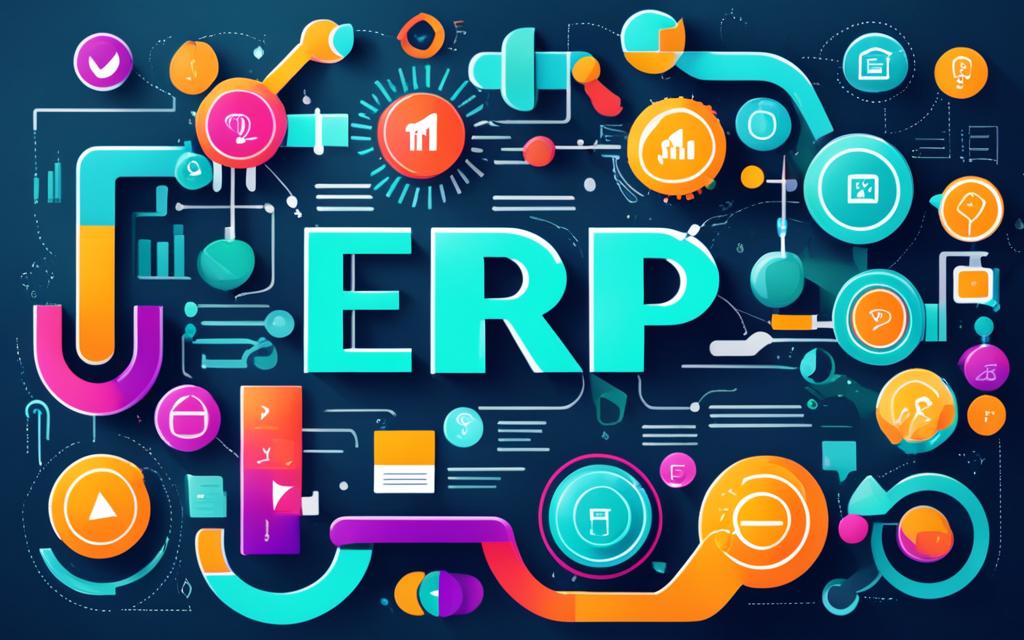Have you felt excited and worried about starting a big project? That feeling when you know the task is big and scares you, but you’re excited? That was me when we began to change how we manage our ERP projects. We had nights without sleep and lots of meetings. But we kept our eyes on the goal: to work better and more together. It’s hard work to plan and stay focused. But in the end, it’s really worth it.
In this world, being great at managing ERP projects is more than following steps. It’s about really knowing your company. Managing ERP projects isn’t just a tech thing; it’s a big plan that changes how we work. With the best way to put in an ERP and great management tips, we turned problems into chances. Experts like Muhammad Imran Sarwar say adding ERP can really change the game. But only if we do it right.
Key Takeaways
- Strategic planning is crucial for successful ERP project management.
- Continuous monitoring ensures the project stays on track.
- Risk management helps mitigate potential issues before they escalate.
- Quality assurance guarantees that the ERP system meets business needs.
- Understanding the impact of ERP systems on project management is vital for long-term success.
Understanding ERP and its Importance in Project Management
Enterprise Resource Planning (ERP) systems combine different business activities. They make sure
finance, HR, and supply chain operations work well together. This helps businesses run smoothly
and grow.
ERP Overview
ERP software streamlines managing key business activities. It helps companies by providing
immediate access to data, enhancing teamwork, and increasing output. Simply put, ERP software makes
planning and completing projects easier and more efficient.
Impact on Project Management
ERP changes project management for the better. It gives project managers up-to-the-minute updates,
helping them track progress and make smart choices. This clear view of projects from start
to finish ensures careful handling of every part.
Furthermore, ERP solutions bring better budget management and openness between departments. This creates
a team-friendly setting that makes planning and doing projects simpler.
The Phases of ERP Project Management
Managing an ERP project is about going through key phases smoothly and successfully. It involves focusing on project management methodologies. This way, one can handle different stages of planning and putting the ERP into action effectively.

Initiation
In the initiation phase, the big players point out what they want and the ERP project’s scope. This step is vital. It sets a clear goal and gets everyone on the same page, making the foundation for the methods used in project management strong.
Planning
The planning phase is all about laying out the ERP project’s timeline, resources, and what needs to be delivered. Here, detailed plans are made. This ensures the ERP’s setup process is organized and well-recorded.
Execution
Execution is when the real work starts. Now, the project group gets busy with software tweaks, joining systems together, and moving data. Good project management means finishing tasks as planned and fixing problems fast.
Monitoring and Control
Monitoring and control keep going even as the execution does. It’s about watching how the project is doing compared to the plan. Then, making changes as needed. Good project management tools help check how things are going and make adjustments on time.
Closure
The closure phase means the ERP setup is done. It’s time to wrap up tasks, get an official okay, and look back on how things went to make sure goals were met. Celebrating achievements and writing down what was learned are also important here.
| Phase | Key Activities | Outcome |
|---|---|---|
| Initiation | Defining goals, identifying stakeholders | Clear project vision |
| Planning | Developing plans, scheduling | Structured project roadmap |
| Execution | Customization, data migration | Functional ERP system |
| Monitoring and Control | Tracking progress, corrective actions | Timely project adjustments |
| Closure | Finalizing activities, reviews | Successful project completion |
ERP Implementation Process
Understanding the ERP implementation process is crucial for businesses aiming to streamline their operations. I will outline the key stages of this process. These include a comprehensive needs assessment, moving into data migration, and concluding with training and support.

Needs Assessment
The first step is a detailed needs assessment. Here, businesses pinpoint their specific requirements. It’s crucial to know what you need from the project management software.
This phase often means gathering input from various departments. They work together to list down all requirements.
Data Migration
The next step is data migration. It’s about carefully moving data to the new ERP software. Proper planning helps maintain data integrity for a smooth transition.
This stage may involve cleaning and mapping data. These steps ensure the new system can work with the old data.
Training and Support
Training and support for employees are the final steps. ERP systems are complex and need proper training for effective use. Support should be ongoing to troubleshoot issues and offer training for continuous improvement.
Implementing an ERP system can greatly enhance efficiency and productivity. It requires thorough planning and strategic execution.
Selecting the Right ERP System
Choosing the right ERP system is very important. It affects how well and how quickly a company can grow. As an ERP project manager, carefully look at what each vendor offers. This ensures it meets your company’s needs.
Vendor Evaluation
There are several things to think about when looking at ERP vendors:
- Track Record: How well a vendor has done in the past shows their reliability and skill.
- Scalability: The ERP system must be able to support your company as it grows.
- Integration Capabilities: It’s important that the ERP can work well with other software you use.
- User Experience: Choose a system that is easy to use and makes people happy to use it.
- Budget Considerations: Find a balance between how much it costs and what it offers.

Customization Options
Customization is crucial for making the ERP system fit your business. When considering customization, I look for:
- Flexibility: The system should be able to change to fit your business’s unique needs.
- Support: Check if the vendor has good support for customizing the system.
Picking the right vendors and knowing how to customize their systems is key. It lets you use project management tools in the best way. This improves the project’s success.
| Criteria | Key Considerations | Importance |
|---|---|---|
| Track Record | Previous successful ERP implementations | High |
| Scalability | Support for growing business needs | High |
| Integration | Compatibility with existing systems and tools | Medium |
| User Experience | Ease of use and user feedback | Medium |
| Budget | Cost vs. features and support | High |
Key Strategies for Successful ERP Implementation
To make sure your ERP implementation is smooth and efficient, start with a clear plan. Use a phased approach, keep a close watch on progress, manage risks well, and always check for quality. This way, your strategy will help you reach your business goals successfully.
Phased Approach
Using a phased approach in ERP is key. It lets you break the project down into parts you can easily handle. This way, you can pay close attention to each part, making changes as needed. It makes it less likely for mistakes to happen and helps things go smoothly.
Continuous Monitoring
It’s important to always keep an eye on your ERP implementation. This helps you catch and fix problems fast. By being proactive, you can make needed changes in real time. This helps keep your project on track.
Risk Management
Good risk management means seeing challenges before they happen. For any ERP plan to work, it needs a strong risk management plan. This helps spot issues early so they can be fixed before they get bigger.
Quality Assurance
Quality assurance is crucial for your ERP system to meet high standards. Testing and checking each part thoroughly is key. By keeping quality high, I make sure the final product is what everyone expects and needs.
Importance of Stakeholder Involvement
Getting stakeholders involved early in ERP project management is key. When project leaders talk to stakeholders early, they make sure everyone wants the same outcomes. This means better use of resources, more support, and a higher chance of project success.
Engaging Key Stakeholders
Bringing in key people is vital for managing ERP projects. This starts with figuring out who the main stakeholders are. They’re usually company leaders, department managers, and users. Having meetings, getting their thoughts, and updating them is crucial. This aligns the project with business goals and makes stakeholders feel involved.
Addressing Concerns
Dealing with stakeholder worries helps the ERP project go smoothly. It’s important to listen and address any concerns they have. This could mean setting clear expectations, offering more training, or changing plans. Being open and clear helps reduce frustrations and makes people happier with the ERP system.
Using feedback and addressing concerns shows why involving stakeholders matters. It keeps the ERP project in line with what the organization and stakeholders want.
| Best Practices | Advantages |
|---|---|
| Early Stakeholder Engagement | Defines Scope & Manages Expectations |
| Regular Communication | Maintains Alignment with Objectives |
| Addressing Concerns | Enhances Acceptance & Satisfaction |
Top Project Management Tools for ERP Implementation
Implementing an ERP system is complex. The right project management tools make it manageable. They give project managers what they need to plan, do, and check on projects. They help everyone stay in touch and keep an eye on how the project is going.
ProMinder 360 is a top recommendation. It helps project managers with real-time teamwork, detailed views, and making workflows your own. It helps watch the project closely. This means managers can spot and deal with possible problems early.
Another top tool is Asana. It’s great because it’s flexible. It’s perfect for ERP projects that keep changing. Its easy-to-use setup makes talking and sharing tasks simple. This ensures the team works well together.
If you need great integration, Jira is a great pick. It’s known for careful issue tracking and reporting. So, managers get the details they need fast. This helps them make smart choices quickly.
Here’s a look at these top project management tools and their key features:
| Tool | Main Feature | Best For |
|---|---|---|
| ProMinder 360 | Customizable Workflows | Real-time Collaboration |
| Asana | User-friendly Interface | Dynamic Projects |
| Jira | Issue Tracking | Integration Capabilities |
Picking the right project planning software is key for ERP success. These tools help project managers a lot. They make sure ERP systems start smoothly and work well.
The Role of Training in ERP Project Management
Training is key to any ERP project’s success. It prepares team members to use the system efficiently. This makes the whole process easier, boosts productivity, and helps everyone get the most out of the new system.
Training is a big part of ERP project management. It’s tailored to meet different users’ needs. Making sure everyone knows how to use the ERP system reduces problems and builds confidence. This is crucial for getting all the benefits of the ERP system, like smoother operations and better data handling.
Now, let’s see why strong training programs are important for ERP project management:
- Improved User Competence: Well-trained workers handle the system better.
- Increased Productivity: Knowing the ERP system well leads to more work done in less time.
- Enhanced Adaptation: Teams get used to new processes faster, so there’s less downtime.
- Sustained ROI: Using ERP fully means getting more value from your investment.
Continuous training updates employees on new features, promoting ongoing learning. Given ERP implementation’s complexity, focusing on training matches well with smart project management. This ensures everyone can fully use the new system.
Managing Risks in ERP Project Management
Risk management is key in successful ERP project planning. Spotting potential risks early helps us stay ahead. This way, our projects keep on the right path. We’ll look into identifying risks and creating plans to tackle any challenges.
Identifying Potential Risks
In ERP project management, many risks may come up. These include technical problems, not enough resources, stakeholder disagreements, or issues with moving data. By assessing risks early, I can sort tasks by risk level. This helps us predict problems and plan ahead.
Developing Mitigation Strategies
After spotting risks, we outline steps to minimize them. We prepare for surprises and make sure we have what’s needed. With tools for managing projects, I keep an eye on how things are going. Adjustments are made when necessary. Keeping everyone informed and using the best tech prevents small issues from growing. This protects our project’s success.

